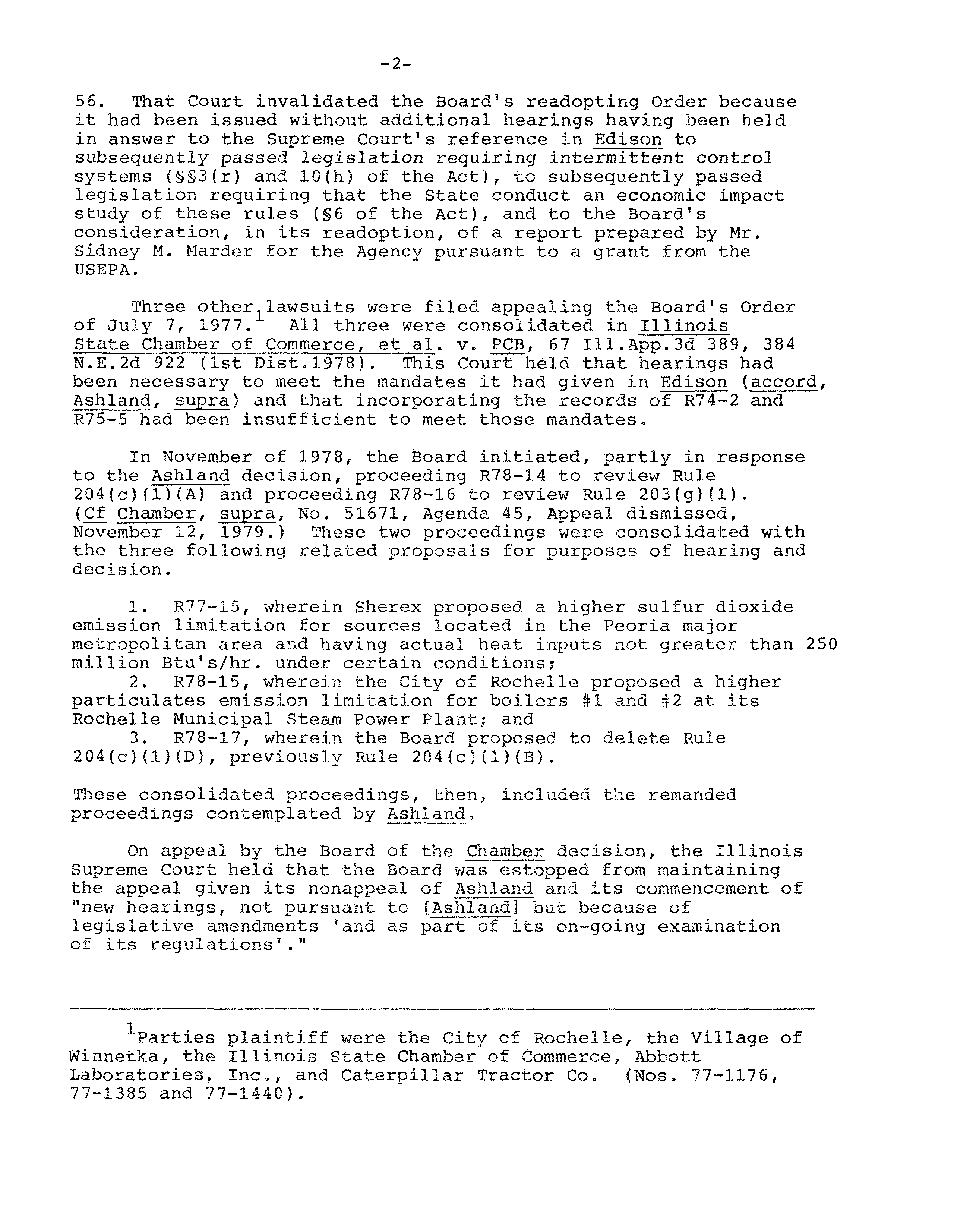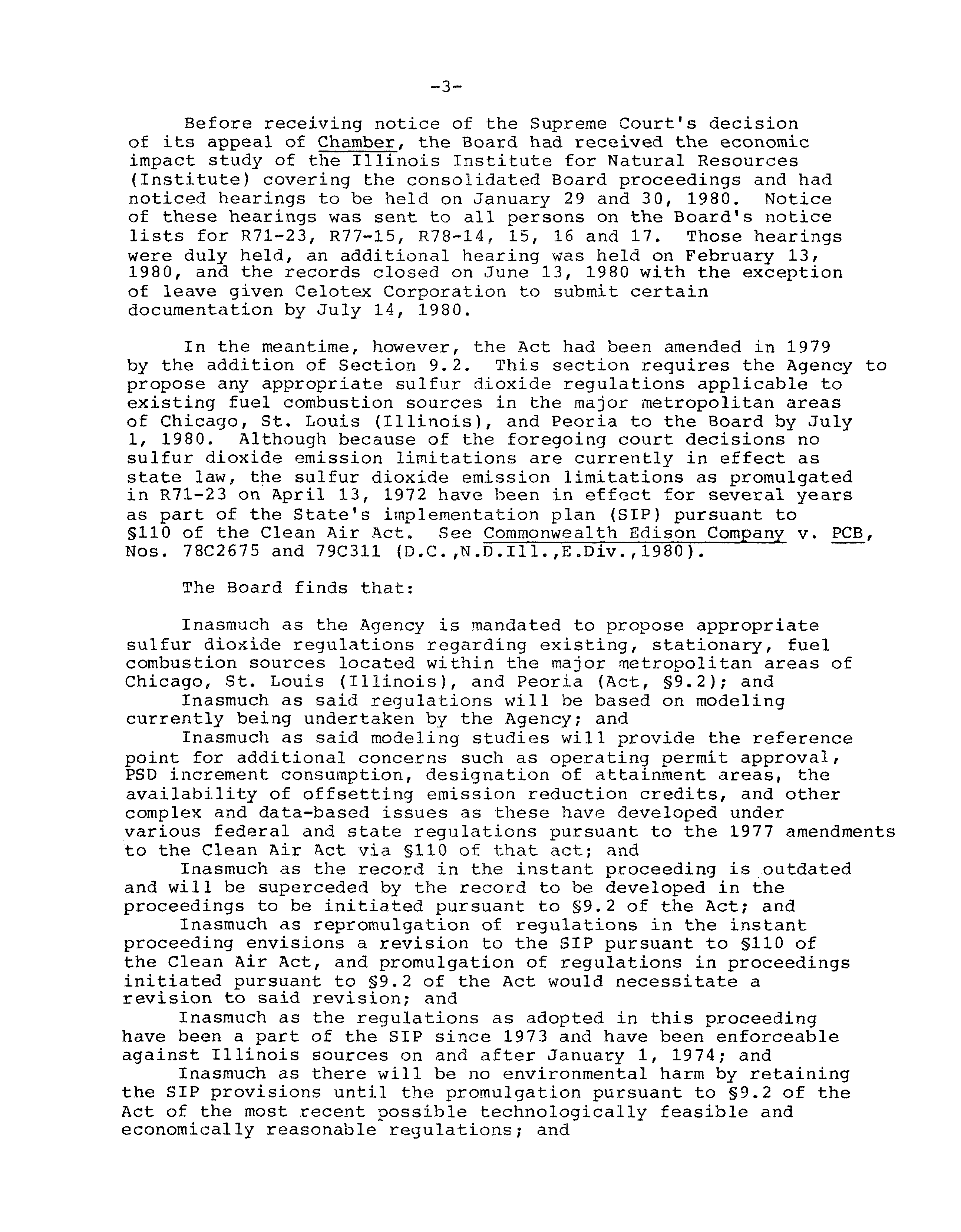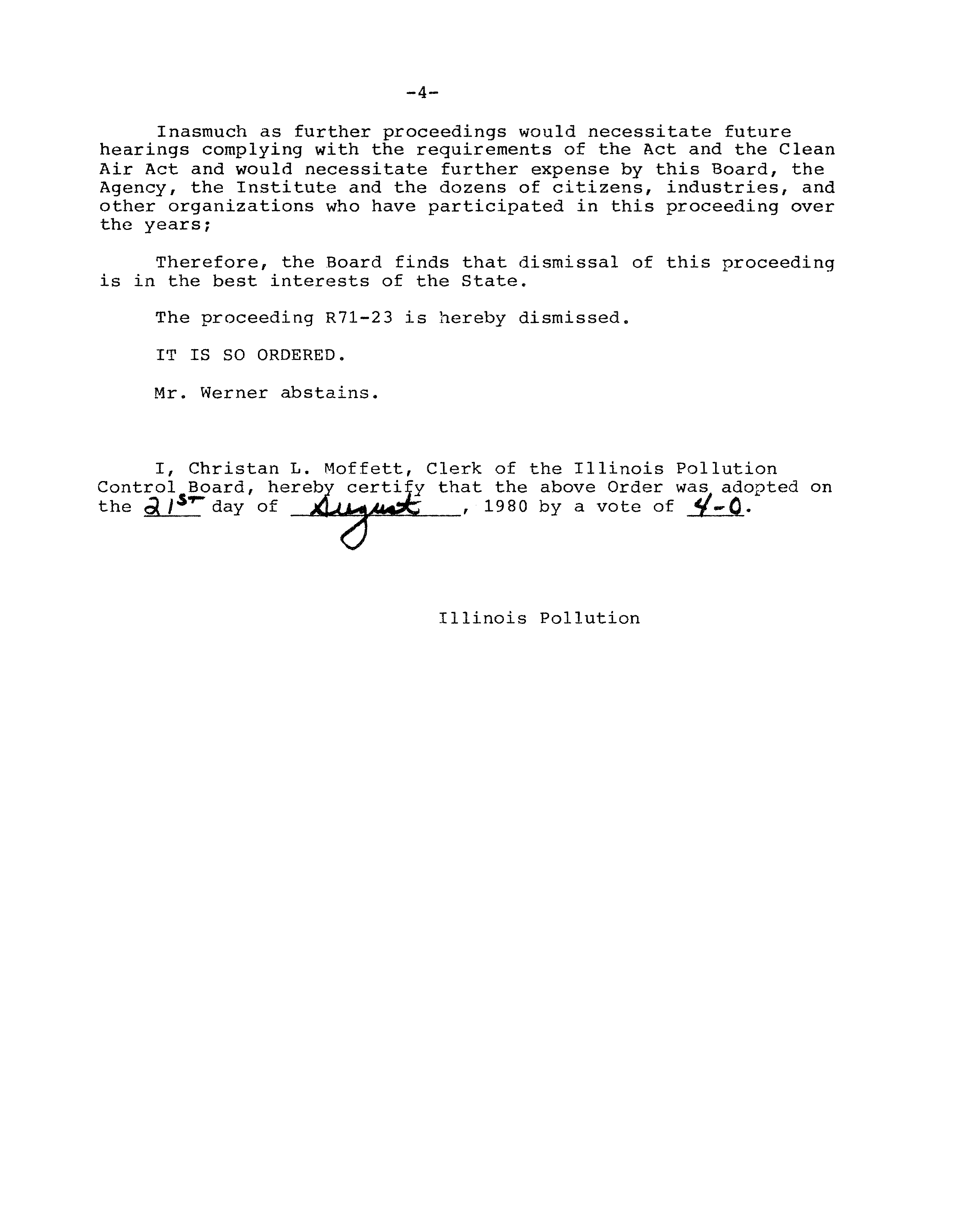ILLINOIS POLLUTION CONTROL BOARD
August
21,
1980
IN THE MATTER OF:
SULFUR
DIOXIDE
REGULATIONS,
)
R71—23
RULE
204(c)(1)(A) AND
RULE
204(c)(1)(D) OF CHAPTER
2.
OPINION AND ORDER OF THE BOARD
(by
I.
Goodman):
The
state’s
sulfur dioxide regulatory proceedings date back
to 1971
(R71—23, Emission Standards).
On April
13,
1972 the
Board adopted the Order
in R71—23, which Order
in part set sulfur
dioxide emission limitations
for existing, exclusively solid fuel
combustion,
stationary sources
located within
the
major
metropolitan areas of Chicago,
St. Louis
(Illinois), and Peoria
(Rule 204(c)(2)(A)) and those located outside these areas
(Rule
204(c)(1)(D), previously Rule 204(c)(2)(B)).
In 1974,
the Illinois Appellate Court
for the First District
in Commonwealth Edison Company v.
PCB,
25 Ill.App.3d 271,
323
N.E.2d 84, reh den January
23,
1975,
remanded these rules to the
Board along with Rule 203(g) (1) regarding particulate emission
limitations
for existing, exclusively
solid
fuel combustion,
stationary and nonstationary sources
located within Illinois.
The Court held the three rules to be invalid under §27 of the
Illinois Environmental Protection Act
(Act) because the Board did
not consider the technological feasibility and economic
reasonableness of compliance with these rules by
a substantial
number of
affected sources by the deadline specified by the
Board.
In 1976,
the Illinois Supreme Court, hearing the appeal
of
that decision, affirmed the decision.
(Commonwealth Edison
Company v.
PCB,
62 Ill.2d 494, 343 N.E.2d 459, reh den March 25,
1976.)
The Court cited that from
the
proceeding R74—2 the
Board acquired a wealth of new information regarding the need to
modify Rule 204 and that in the proceeding R75—5 the Illinois
Environmental Protection Agency
(Agency) had proposed amendments
to that rule.
As amicus curiae,
the United States Environmental
Protection Agency
(USEPA) had briefed the argument that the three
remanded rules had correctly interpreted the technology—forcing
intent of the Clean P~irAct
(42 U.S.C.
§7401, et~a.).
On July
7,
1977 the Board readopted the three remanded rules
of R71—23.
In 1978, Ashland Chemical Company
(Sherex) appealed
that Order
to the Third District Appellate Court
in
Ashland Chemical Company v.
PCB,
64 Ill.App.3d 169,
381 N.E.2d
—2—
56.
That Court invalidated the Board’s readopting Order because
it had been issued without additional hearings having been held
in answer to the Supreme Court’s reference in Edison to
subsequently passed legislation requiring intermittent control
systems (S~3(r)and 10(h)
of the Act), to subsequently passed
legislation requiring that the State conduct an economic impact
study of these rules
(S6 of the Act),
and to the Board’s
consideration,
in its readoption,
of a report prepared by Mr.
Sidney
M. Marder for the Agency pursuant to a grant from the
USEPA.
Three other1lawsuits were filed appealing the Board’s Order
of July
7,
1977.
All three were consolidated in Illinois
State Chamber of Commerce, et al,
v.
PCB,
67 Ill.App.3d 389,
384
N.E.2d
922
(1st Dist.1978).
This Court held that hearings had
been necessary to meet the mandates it had given
in Edison
(accord,
Ashland,
supra)
and that incorporating the records of R74—2 and
R75—5 had been insufficient to meet those mandates.
In November of 1978,
the l3oard initiated, partly in response
to the Ashland decision, proceeding R78-14 to review Rule
204(c)(1)(A)
and proceeding R78-’lG
to
review Rule 203(g) (1).
(Cf Chamber, supra,
No,
51671, Agenda 45,
Appeal dismissed,
November 12,
1979,)
These two proceedings were consolidated with
the three following related proposals for purposes of hearing and
decision.
1.
R77—15, wherein Sherex proposed a higher sulfur dioxide
emission limitation for sources located in the Peoria major
metropolitan area and having actual heat inputs not greater than 250
million Btu’s/hr, under certain conditions;
2.
R78—15, wherein the City of Rochelle proposed
a higher
particulates emission limitation for boilers #1 and
#2 at its
Rochelle Municipal Steam Power Plant;
and
3.
R78—17, wherein the Board proposed to delete Rule
204(c)(i)(D), previously Rule 204(c)(1)(B),
These consolidated proceedings,
then,
included the remanded
proceedings contemplated by Ashland,
On appeal by the Board of the Chamber decision, the Illinois
Supreme Court held that the Board was estopped from maintaining
the appeal given its nonappeal of Ashland and its commencement of
“new hearings, not pursuant to
Ashland
but because of
legislative
amendments ‘and as part
of its
on—going examination
of
its regulations’.”
1Parties plaintiff were the City
of
Rochelle, the Village of
Winnetka,
the
Illinois State Chamber of Commerce,
Abbott
Laboratories,
Inc.,
and Caterpillar Tractor Co.
(Nos. 77-1176,
77—1385 and 77—1440),
—3—
Before receiving notice
of the Supreme Court’s decision
of its appeal of Chamber, the Board had received the economic
impact study of the Illinois Institute for Natural Resources
(Institute) covering
the consolidated Board proceedings and had
noticed hearings to be held on January 29 and 30,
1980.
Notice
of
these hearings was sent to all persons on the Board’s notice
lists for R71—23, R77—15,
R78—14,
15,
16 and 17.
Those hearings
were duly held,
an additional hearing was held on February 13,
1980,
and the records closed on June 13,
1980 with the exception
of leave given Celotex Corporation to
submit certain
documentation by July 14,
1980.
In the meantime, however,
the Act had been amended in 1979
by the addition of Section 9.2.
This section requires the Agency to
propose any appropriate sulfur dioxide regulations applicable to
existing fuel combustion sources
in
the major metropolitan areas
of Chicago,
St.
Louis
(Illinois), and Peoria to the Board by July
1,
1980.
Although because of the foregoing court decisions no
sulfur dioxide emission limitations are
currently
in effect
as
state
law, the sulfur dioxide emission limitations as promulgated
in R71—23 on April
13,
1972 have been in effect for several years
as part of the State’s implementation plan (SIP)
pursuant to
§110 of the Clean Air Act,
See Commonwealth Edison Company
v.
PCB,
Nos.
78C2675 and 79C311
(D.C. ,N.D.Ill.,E,Div.,1980).
The Board finds
that:
Inasmuch as the Agency
is mandated to propose appropriate
sulfur dioxide regulations regarding existing,
stationary,
fuel
combustion sources located within the major metropolitan areas of
Chicago,
St.
Louis
(Illinois), and Peoria
(Act, §9.2);
and
Inasmuch as said regulations will be based on modeling
currently being undertaken by the Agency;
and
Inasmuch as said modeling studies will provide the reference
point for additional concerns such as operating permit approval,
PSD increment consumption, designation of attainment areas,
the
availability of offsetting emission reduction credits,
and other
complex and data—based issues as these have developed under
various federal and state regulations pursuant to the 1977 amendments
to the Clean Air Act via §110 of that act;
and
Inasmuch as the record in the instant proceeding
is outdated
and will be superceded by the record to be developed in the
proceedings
to be initiated pursuant to §9.2 of the Act; and
Inasmuch as repromulgation of regulations in the instant
proceeding envisions a revision
to the SIP pursuant to §110 of
the Clean Air Act, and promulgation of regulations in proceedings
initiated pursuant to §9.2 of the Act would necessitate
a
revision to said revision;
and
Inasmuch as the regulations as adopted in this proceeding
have been a part of the SIP since 1973 and have been enforceable
against Illinois sources on and after January
1,
1974; and
Inasmuch as there will be no environmental harm by retaining
the SIP provisions until
the promulgation pursuant to §9.2 of the
Act of the most recent possible technologically feasible and
economically reasonable regulations;
and
—4—
Inasmuch as further proceedings would necessitate future
hearings complying with the requirements of the Act and the Clean
Air Act and would necessitate further expense by this Board, the
Agency, the Institute and the dozens of citizens, industries,
and
other organizations who have participated in this proceeding over
the years;
Therefore, the Board
finds that dismissal
of this proceeding
is in the best interests of the State.
The proceeding R71-23 is hereby dismissed,
IT IS SO ORDERED,
Mr. Werner abstains.
I, Christan L.
Moffett,
Clerk of the Illinois Pollution
Control Board, hereb
certi y that the above Order was adopted on
the ~j3’
day of
_____________,
1980 by a vote of
___
Illinois Pollution





